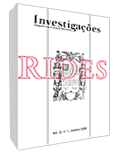Digressão e desordem: a experiência da temporalidade em Grande Sertão: Veredas e seu valor cognitivo ante a cultura atual
Abstract
O intuito deste ensaio é, a partir do texto de T. S. Eliot (1998) sobre o Hamlet de Shakespeare e das idéias desenvolvidas por Henri Bergson em seu Ensaio sobre os dados imediatos da consciência (1988), pôr em evidência alguns aspectos estruturais do Grande Sertão: Veredas, aspectos que fazem dele o portador de uma postura ética e epistemológica ainda válida como resposta às aporias da cultura contemporânea.References
BERGSON, Henri. 1988. Ensaio sobre os dados imediatos da consciência. Trad. João da Silva Gama. Lisboa: Edições 70.
ELIOT, T. S. 1991. Hamlet. In: T. S. Eliot. 1998. Poems and prose. Nova York, Toronto: Alfred A. Knopf. p. 131-9
FRIEDRICH, Hugo. 1991. Estrutura da lírica moderna: da metade do século XIX a meados do século XX. Trad. Marise M. Curioni. São Paulo: Duas Cidades.
MALLARMÉ, Stéphane. 1991. Poesias. Trad. Augusto de Campos. In: Augusto de Campos, Haroldo de Campos, Décio Pignatari. Mallarmé. São Paulo: Perspectiva.
ROSA, João Guimarães. 1973. Grande Sertão: Veredas. Rio de Janeiro: José Olympio.
______. 1976. Tutaméia: terceiras estórias. Rio de Janeiro: José Olympio.
Downloads
Published
How to Cite
Issue
Section
License
Copyright (c) 2008 Artur Almeida de Ataíde

This work is licensed under a Creative Commons Attribution 4.0 International License.
Authors who publish with Revista Investigações agree to the following terms:
Authors retain copyright and grant the journal right of first publication with the work simultaneously licensed under the Creative Commons Attribution 4.0 International (CC BY 4.0) license that allows others to share the work with an acknowledgement of the work's authorship and initial publication in this journal.
Authors are able to enter into separate, additional contractual arrangements for the non-exclusive distribution of the journal's published version of the work (e.g., post it to an institutional repository or publish it in a book), with an acknowledgement of its initial publication in this journal.
You are free to:
Share — copy and redistribute the material in any medium or format for any purpose, even commercially.
Adapt — remix, transform, and build upon the material for any purpose, even commercially.
The licensor cannot revoke these freedoms as long as you follow the license terms.
Under the following terms:
Attribution — You must give appropriate credit , provide a link to the license, and indicate if changes were made . You may do so in any reasonable manner, but not in any way that suggests the licensor endorses you or your use.
No additional restrictions — You may not apply legal terms or technological measures that legally restrict others from doing anything the license permits.

